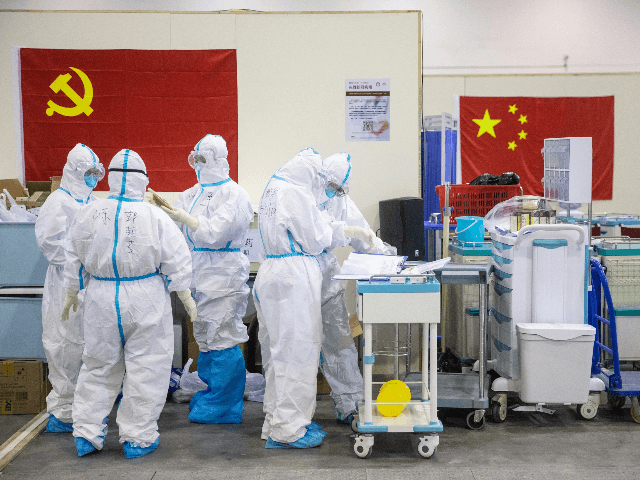The Taiwan Ministry of Health and Welfare (MOHW) on Thursday advised young and elderly citizens, as well as those with weak immune systems, to avoid travel to China during its surge of respiratory illness.
The Chinese government continues to insist it has the outbreak under control, but observers recently noticed the return of travel restrictions and spraying of public areas with disinfectant, techniques Beijing used during the coronavirus pandemic.
The MOHW issued a statement after the weekly Cabinet meeting that recommended avoiding unnecessary travel to China, Hong Kong, and Macau. The ministry advised travelers who do visit those destinations to receive flu and Wuhan coronavirus vaccinations before departing.
Reuters on Thursday quoted some epidemiologists who thought Taiwan’s travel advisory could be excessive or counter-productive, while others saw it as a prudent precaution:
Shu-Ti Chiou, an epidemiologist at the Health & Sustainable Development Foundation in Taipei, said the advisory would lead the public to mistakenly believe they would not contract respiratory illnesses as long as they did not go to China.
Rajib Dasgupta, an epidemiologist and professor of community health at Jawaharlal Nehru University in New Delhi, also said “travel restrictions for respiratory infections are not an effective measure for interrupting transmission”.
Some public health researchers said the travel advisory was reasonable, saying Taiwan was also likely to experience a surge in respiratory illnesses in winter and following the lifting of pandemic restrictions. “They would be cautious not to hasten it by overseas travels,” said Sung-il Cho, an epidemiologist at Seoul National University.
As the world learned, to its enormous cost, during the Wuhan coronavirus pandemic, the Chinese government opposes travel restrictions imposed by anyone else, treating them as insults to the regime while freely imposing its own lockdowns and travel restrictions whenever it feels the need.
The Chinese government also has a history of covering up the severity of disease outbreaks, even before the Wuhan coronavirus pandemic. As Reuters noted, the memory of China covering up the SARS outbreak of 2002-2003 looms large in Taiwan’s memory.
Chinese Foreign Ministry spokesman Wang Wenbin insisted on Thursday that the respiratory illness outbreak in China is under control and is nothing more than a slightly more severe cold and flu season than usual.
“This is not a question about foreign affairs,” Wang snapped when a reporter asked about Taiwan’s travel advisory.
“It is safe to travel, do business and study here in China and there’s no need to worry,” he asserted.
Contrary to the insistence of the Chinese government, Taiwan is a sovereign nation separate from China.
China’s state-run Global Times admitted on Wednesday that hospitals are struggling to cope with the “surge in cases of respiratory illnesses in children,” but it claimed “the health system has not been overwhelmed as it did during the early stage of the fight against [Wuhan coronavirus].”
The Global Times said Chinese pediatric hospitals have made “improvements” that help them deal with the surge of sick children, including increases of more than 50 percent in beds and medical staff to handle the crisis. One hospital administrator told the Global Times his facility had reactivated its coronavirus treatment wards to “accommodate the surge” in respiratory virus cases:
While some pediatric hospitals may have long queues and limited ward availability, overall, medical resources have not reached an overwhelmed state. Hospitals have learned from their experiences with Covid-19 and have developed strategies to prioritize severe cases and classify treatment based on symptoms.
Chinese social media has been filling up with photos and videos of anguished parents and sick children packed into overcrowded waiting rooms, but the Global Times insisted hospitals are taking appropriate steps to handle the caseload. The Chinese Communist paper attributed the horror stories about overflowing waiting rooms filled with sick children to parents who mistakenly insisted on bringing their kids to the hospital for minor illnesses instead of using community clinics.
Chinese doctors told the Global Times they see no evidence of a novel pathogen like the Wuhan coronavirus in the current outbreak, just a surge of mycoplasma pneumonia, which they portrayed as a lingering hangover from the coronavirus lockdowns. Some epidemiologists in the U.S. have likewise postulated that an exceptionally busy cold and flu season might be due to coronavirus restrictions preventing people from developing normal, natural immunities.
The South China Morning Post (SCMP) reported Tuesday that some coronavirus control measures are beginning to reappear in China, especially at “schools, childcare institutions, and nursing homes.”
Residents of the Chinese city of Sanhe have posted videos of ominous hazmat-suited workers spraying clouds of disinfectant over classrooms and city streets — a tactic China developed during the later stages of the pandemic when entire cities were locked down, and terrified residents were sealed into their apartments.
On November 24, in Sanhe City, Hebei Province, due to the recent influenza epidemic such as mycoplasma pneumonia, Sanhe City Emergency Rescue Center organized staff wearing Dabai protective clothing to enter the premises field to carry out disinfection work.#China #Hebei pic.twitter.com/NISAcfrC25
— Spotlight on China (@spotlightoncn) November 27, 2023
Some Chinese social media users were horrified by the return of the dabai or “big white men,” a term that became popular during the pandemic for teams of government enforcers clad in bulky white hazmat suits.
“Oh, my God. It’s almost 2024 and this familiar scene is back!” one poster on Douyin, China’s version of TikTok, exclaimed.
The SCMP quoted Chinese National Health Commission spokesman Mi Feng calling for “effective epidemic prevention and control measures in key locations with dense populations, such as schools, childcare institutions and nursing homes.”
“This includes minimizing personnel movement and visits,” Mi added.

COMMENTS
Please let us know if you're having issues with commenting.